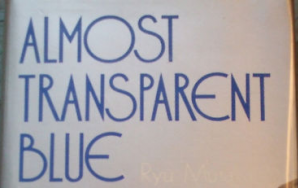
Almost Transparent Blue by Ryu Murakami
Almost Transparent Blue (1976) was written by Ry? Murakami (b. 1952) while he was a student at Musashino Art University, where he was enrolled in the sculpture program. It was his first novel and was awarded the Akutagawa Prize (Japan’s “most sought after” literary prize; previous winners include Kobo Abe and Kenzaburo Oe) and sold…
By Tao Lin
TONE
Here is how I perceived Almost Transparent Blue to be written, I think:
Ryu Murakami: “I am going to write a book in past-tense first-person. To do this I am going to occupy the perspective of a narrator. I will allow the narrator to have the same memories I have, but I’m willing to change or not change those memories for whatever reason, I think.”
Narrator: “I am going to convey selections from my memory of my life. To do this I am going to occupy the perspective of a character that is myself-in-the-past. I am willing to include things the character might not have noticed, in the moment, with their full attention, but I will not include things the character was completely unaware of or didn’t think or feel or know at the time.”
Character: “I seem to be exactly what is conveyed with the entirety of the book and what each reader uniquely thinks and feels while and after reading the book.”
The tone—or in what manner the narrator is influencing me to think and feel about what he is conveying—of Almost Transparent Blue seemed consistently to be “this is something that happened.” Similar to how concrete reality doesn’t tell me what to feel or think about it I didn’t feel that the narrator was saying “this is funny” or “this is emotional” or “this is absurd.”
Some books with a tone of “this is something that happened” contain only concrete descriptions, with little to no abstractions or thoughts. Almost Transparent Blue—which has abstractions, thoughts, feelings—was more like “this is something that happened from the perspective of one character, who viewed their own thoughts and feelings also as ‘things that happened,’ and so did not attempt to interpret them for himself or an imaginary other.”
I would describe the character, Ryu, as calm and observant in an almost idly confused manner, as a result of being aware of and affected by the “mysteriousness” of existing in the universe, as opposed to the “instability” (The Easter Parade), “tediousness” (The Book of Disquiet), “indifference” (The Stranger), “shittiness” (Woodcutters), “absurdity” (Breakfast of Champions), “insignificance” (The Sirens of Titan), “loneliness” (Good Morning, Midnight) of existing in the universe, I think.
He seems attentive to details that are psychologically irrelevant to what’s happening in the scene, in terms of the social situations, in a manner that makes it seem like he is being affected by a larger confusion or idleness, like when, due to idleness or boredom or confusion, you stare blankly and accidentally focus on something you normally wouldn’t, then begin thinking about it—but while feeling a “gnawing” sensation that there are other thoughts you’re not thinking about because you’ve become fixated, almost accidentally, on something that has no emotional bearing on you.
“LAYERED” EFFECT OF THIS TONE
Because Ryu seemed like a real person to me I felt that he had seven main “threads” simultaneously/continuously occurring—
1. what his body/face are concretely doing
2. what he hears himself and others saying
3. what he’s focused on listening to or looking at (usually not related to 1. or 2.)
4. what he’s thinking (usually not related to 1. or 2. or 3.)
5. what he’s feeling physically
6. what he’s feeling emotionally (rarely conveyed)
7. what he feels existentially (see central event/theme)
—of which only one to three, I think, could be conveyed in each moment. It seems like the narrator chose, most times—but not always, I feel—which “thread” to focus on by choosing the one that, in the moment, seemed most prominent, for whatever reason, to Ryu, in his state of idle confusion, not what seems most prominent to someone in the future attempting to form a rhetorical message from a set of past occurrences.
This creates, to me, the above “layered” effect because it seems like the only message conveyed is something like “Ryu has as much of a memory and as complex a consciousness as a real person in concrete reality does,” causing me to automatically at least attempt to view Ryu in that manner.
I think I can differentiate a novel based on memory—which is how I view Almost Transparent Blue—from a novel based on imagination pretty easily, because to convincingly portray a character as having seven continuous/simultaneous “threads” would require seven very large first-drafts, one for each “thread,” which seems almost impossible to completely “make up,” but is readily available (and easily editable, searched, organized) to people who have a memory of their life.
After I discern that a novel is based on memory I think I can discern if the novel is based on distant memory (if much of it is summarized, if dialogue is paraphrased, if some characters seem to not have all seven “threads” occurring simultaneously/continuously) or recent memory combined with meticulous, patient, “other”-focused “study” of the memory (if much of it is in scenes, if dialogue is not paraphrased, if the other characters in the book seem like they have all seven “threads” occurring simultaneously/continuously).
In Almost Transparent Blue all eight of the main characters seemed like real people, in that I was able to assume each had seven “threads” simultaneously/continuously occurring. Reading it (after the third or fourth reading, I think) I could “feel” that Ryu Murakami had studied each of the eight characters’ dialogues and actions, in his memory—in a manner that, thinking about my own memory of other people, seems like it required high levels of concentration, over long periods of time, with the first “study” occurring maybe as it happened—for what each of them were feeling emotionally, feeling physically, feeling existentially, focused on ostensibly, focused on privately, thinking about.











